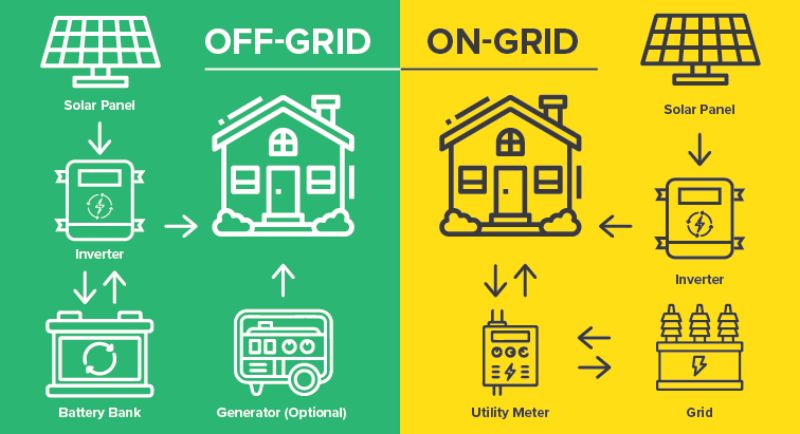Grid-tied and off-grid solar systems are the two main types available for purchase. As the name suggests, grid-tied solar refers to solar panel systems that are connected to the grid, while off-grid solar refers to solar systems that are not connected to the grid. There are many options when it comes to installing a solar panel system in your home. You need to make a wise choice because you have invested a large amount of money in a residential solar panel system and want it to last a long time. Let’s dispel one of the most common myths in the solar industry: the notion that going solar requires going "off the grid.
What is a Grid-Tied Solar Energy System?
Solar panels generate solar energy in a grid-tied system. When the home needs more power, the excess energy is sent to the utility grid, which provides additional power. The solar panel system is connected to transfer power between the solar panels, the house, and the grid, and the solar panels are mounted where there is adequate sunlight, usually on the roof, but in other locations such as the backyard, and wall mounts are also possible. Grid-tie inverters are critical to grid-tied solar panel systems. The grid-tie inverter controls the flow of power to your residential solar panel system. It first delivers energy to your home and then exports excess power to the grid. In addition, they do not have a solar battery storage system. As a result, grid-tied solar systems are more affordable and easier to install.
What is an Off Grid-Tied Solar Panel System?
Solar panel systems store electricity in solar panels and operate off the grid, a system known as off-grid solar. These technologies promote off-grid living, a lifestyle focused on sustainability and energy independence. The rising costs of food, fuel, energy, and other necessities have made off-grid living more popular in recent years. As electricity prices have risen over the past decade, more and more people are looking for alternative energy sources for their homes. Solar power is a reliable and environmentally friendly source of energy that you can use to power your home off the grid. However, off-grid solar panel systems require different components than grid-tied systems.

How do I get electricity?
Grid-tied solar: Unless there is a power outage, you can always get electricity from the grid by connecting your solar system to the grid. Therefore, a grid-tied system is more reliable and does not need solar panels when the solar panels are not producing enough energy.
Off-Grid Solar: With an off-grid solar system, you can only get electricity when the solar panels are producing energy or when you are using solar batteries to store energy. In the evening or on cloudy days, the system produces less energy. Therefore, solar batteries are very important for off-grid solutions. You will be more dependent on the power stored in the battery than you would be with a grid-tied system.
Grid-tied or off-grid solar panel systems: Which is better?
For most people, a grid-tied solar system is an excellent solar energy investment that brings stability and reliability to a business, farm, or home. Grid-tied solar systems have a shorter payback period and fewer parts to replace in the future. For some cabins and more remote locations, off-grid solar systems are a good option, but the payback period and return on investment for off-grid systems is currently difficult to match that of grid-tied systems.
A good solar panel installer can help you determine which type of solar system is right for your location. Visit "SUNRUNE SOLAR" to learn more about solar inverter installation services. We are committed to providing you with the best possible service and products. If you have any questions, our energy experts are here to help.
Post time: Sep-20-2023